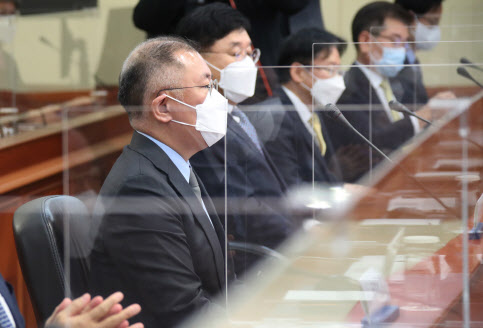Hyundai Motor Group recently asked the Fair Trade Commission to change the same person of the Hyundai Motor Group from Honorary Chairman Chung Mong-koo to Chairman Eui-Sun Eui-seon. Internally, the FTC is considering whether to keep the Honorary Chairman Chung as the same person as it was in the past, or whether to designate Chairman Chung as the same person in consideration of changes in the world.
If the FTC changes the same person of Hyundai Motor Group to Chairman Chung, Sampyo Group, whose main business is cement, will be incorporated into a Hyundai Motor subsidiary. Chairman Jeong Do-won, the owner of this group, is the father-in-law of Chairman Chung. Under the Fair Trade Act, if a relative of the same person within 6 villages or a relative within 4 villages owns more than 30% of the total number of issued shares of each company, the Fair Trade Commission considers that the same person is influencing the company and incorporates it as an affiliate.
Sampyo is a holding company owned by Sampyo Won Jeong-won, 81.9% of its shares, and has affiliates such as Sampyo Industries and Sampyo Mention. Its main business is manufacturing ready-mixed concrete, aggregate, and cement, which are the basic materials for construction.
In consideration of the change of the same person to Chairman Chung, Hyundai Motor Group is collecting information on the stakes of Sampyo affiliates owned by not only Chairman Jeong Do-won but also his relatives. In the worst case, if the stock ownership status is submitted incorrectly, Chairman Chung can be accused of prosecution.
|
The 21st century joint-in-law system… Ambiguous’de facto domination’ criterion
The reason why Hyundai Motor Group and Sampyo Group were tied to such a’joining system’ even in the 21st century is due to the regulation of conglomerates (chaebols) created in 1987. This system was created to prevent excessive concentration of economic power due to chaebol’s front-end management and family management.
The core of this system is the designation of the same person, but the Fair Trade Act does not even have a clear definition of the same person. The law only stipulates that a’corporate group is a group of companies whose business content is effectively controlled by the same person’. Whether or not’in fact control’, which is the criterion for designating the same person, was determined by the ownership ratio or control power in the decree.
The quantitative condition is stock’share ratio’ and the qualitative condition is’dominant influence’. In general, the 1st and 2nd generation chaebols have largely reflected the requirements for ownership. This is because the same person secures a stake in a company that is the core of the circular shareholding structure and controls the group through it.
The proportion of qualitative evaluation increased as it moved to the third generation management. Whether or not a person with at least the same share of the company appoints the company’s executives or makes major decisions.
An official at a large law firm said, “Because there is no clear definition of the same person, the Fair Trade Commission has no choice but to arbitrarily designate a driver. Even though it is not easy, the FTC is not actively promoting the reform of the system.”
Since the range of affiliates is wide, there are situations where it is difficult to understand in common sense. A representative case is the case that companies that are not related to the same person, such as Hyundai Motor Company and Sampyo Group, are attached as affiliates. In the past, a subsidiary of Hoban Group, a construction company, was included as an affiliate of Segi Sang, a private equity firm. Segi Sangsa operates the Daehan Theater located in Chungmuro, Jung-gu, Seoul.
The Fair Trade Commission said to improve the same person system for years
However, the Fair Trade Commission established an independent kinship management system. If it is proved that even a relative of the same person operates independently, the FTC will exclude it from affiliates. However, △ each company owns less than 3% of the same person’s stake △ Less than 3% of the same person’s affiliates owned by independent managers △ No co-representation of executives △ Debt guarantees between the same person’s affiliates and relatives affiliates, no unreasonable large-scale internal transactions You have to prove it.
However, while acknowledging the necessity of reorganizing fundamentally the same system and regulation of large corporations, they are actually giving up.
In the process of changing the same person between the Samsung Group and Lotte Group in 2019, the FTC said, “It is necessary to review the designation procedure in order to increase transparency and predictability.”
A key official of the FTC said, “We are having several discussions inside,” but said, “It was difficult to draw a conclusion because if the method of designating the same person is changed, the entire policy of large corporations could be reversed.” The FTC said that major conglomerates have improved a lot, but many of the groups still maintain the old chaebol management method, making it difficult to improve the system right away.
Experts suggest that it will be difficult to improve the system right away, but the FTC should go into the preparation process so that it can improve chaebol policies in line with corporate changes in the mid to long term.
Bong-eui Lee, a professor at Seoul National University Law School, said, “The framework of the chaebol regulation that has been sustained for the past 35 years needs to be fundamentally reviewed in consideration of environmental changes and internal changes in the chaebol.” There is a need.”
|
▷Terminology: Same person
Those who actually dominate the group’s business. It is designated by the Fair Trade Commission in consideration of the ownership ratio or the appointment of executives and whether major decisions are made. When the same person is designated, the range of affiliates is determined in consideration of the share of relatives within 6 villages and relatives within 4 villages, and regulations to drive work are enforced.


